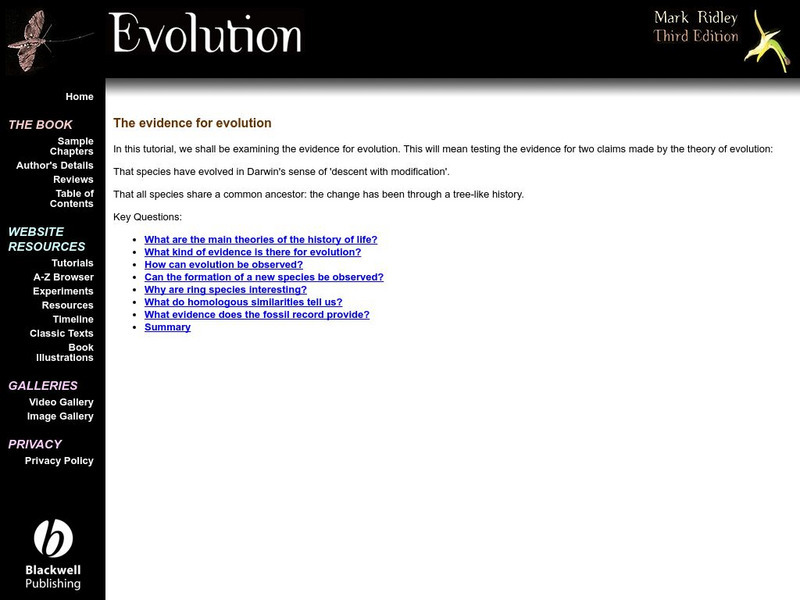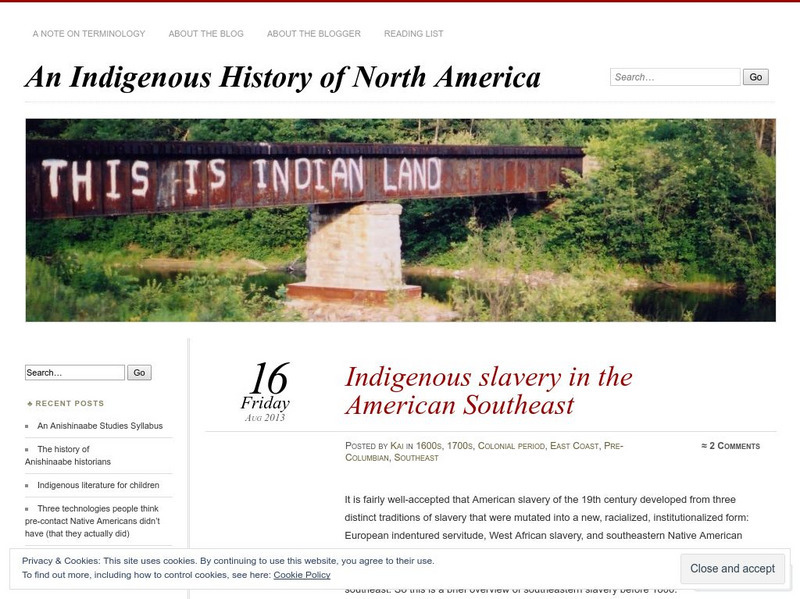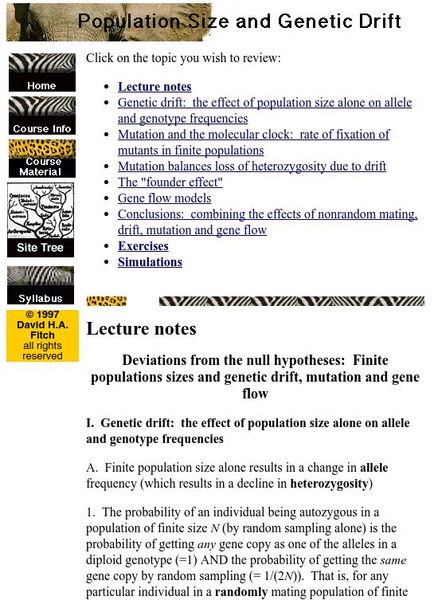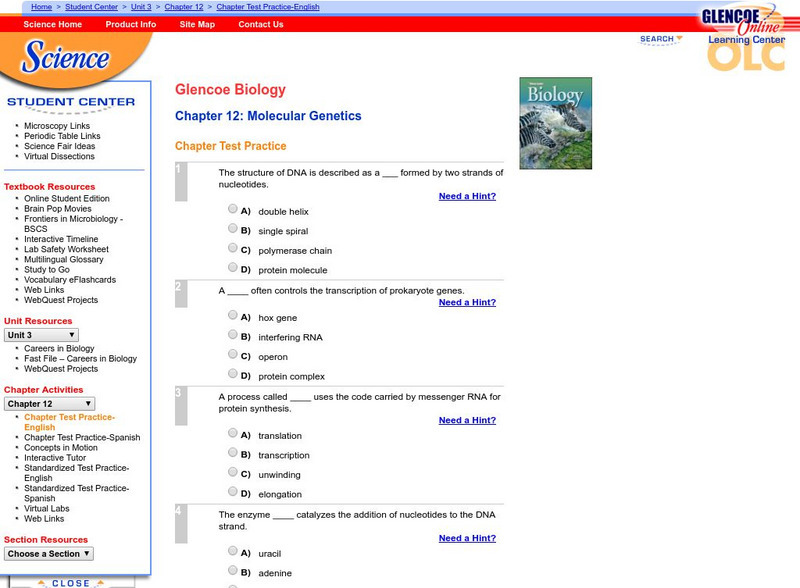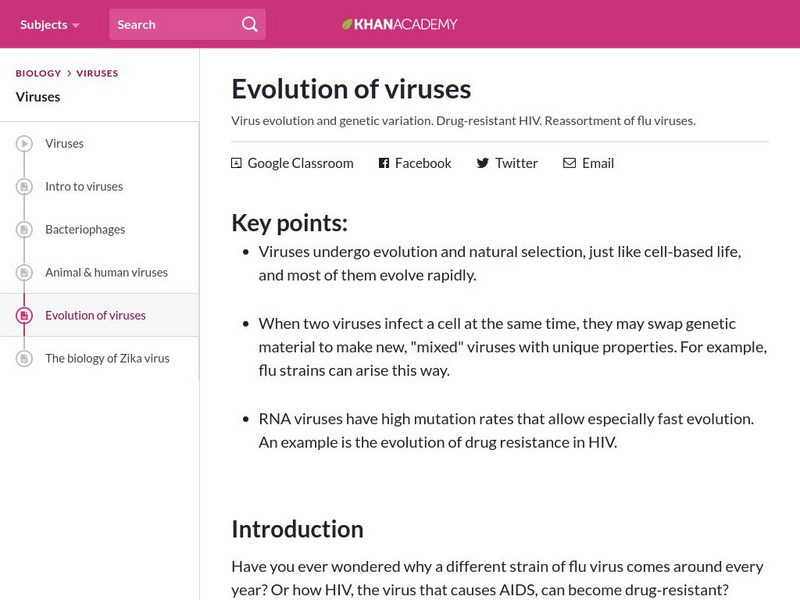Other
The Evidence for Evolution
These pages are part of a site called "Evolution," that accompanies a textbook by the same name. Mark Ridley is the author, and in this section he discusses the evidence for evolution.
BBC
Bbc: Gcse Bitesize: Evolution
Evolution is the change of inherited characteristics within a population over time through natural selection, which may result in the formation of a new species.
TED Talks
Ted: Ted Ed: The Strange Case of the Cyclops Sheep
In the 1950s, a group of ranchers in Idaho were baffled when their sheep gave birth to lambs with only one eye. Mystified by these cyclops sheep, they called in scientists from the U.S. Department of Agriculture to investigate. What...
BiologyWise
Biology Wise: Genetic Diversity Explained With Examples
Explains what genetic diversity is, things that cause it, factors that affect it negatively, and why it is so important. Includes examples of the presence and absence of genetic diversity.
Khan Academy
Khan Academy: Cellular Division Questions
This study resource from Khan Academy provides practice questions for the MCAT. "Cellular division" questions are provided on this resource.
PBS
Pbs Learning Media: Dna and Protein Synthesis in the Cell
In this lesson, students learn how DNA fits into chromosomes, how chromosomes relate to the human body, DNA replication, and protein synthesis.
University of Arizona
University of Arizona: Problemas De Genetic Molecular De Procariotas
Learn more about the operon model based on studies of lactose-dependent mutations of E. coli with the series of problems presented here. The correct answers have a brief explanation to reinforce the theories and incorrect answers are...
University of California
University of California Museum of Paleontology: Evolution at Different Scales
Macroevolution and microevolution are defined, along with mutation, migration, genetic drift, and natural selection, which are "established mechanisms of evolutionary change."
Other
Indigenous History: Indigenous Slavery in the American Southeast
It is fairly well-accepted that American slavery of the 19th century developed from three distinct traditions of slavery that were mutated into a new, racialized, institutionalized form: European indentured servitude, West African...
BiologyWise
Biology Wise: What Is a Stop Codon?
A stop codon is a nucleotide triplet in messenger RNA that signals the end of a protein during the translation process. Read about how this works, the different types of stop codons, and how a mutation can sometimes occur.
BiologyWise
Biology Wise: Start Codon
A start codon is a nucleotide triplet in a genetic sequence that occurs at the start of a protein's synthesis. Read about how this works and how a mutation can sometimes occur.
Science Daily
Science Daily: Antibiotic Resistance
Antibiotic resistance is the ability of a microorganism to withstand the effects of an antibiotic. It is a specific type of drug resistance. Antibiotic resistance evolves naturally via natural selection through random mutation, but it...
City University of New York
Bio Lab Module: Breaking the Genetic Code
Try this interactive module from the Brooklyn College to help understand the genetic code and how changes in the code effect the final protein product.
New York University
Population Size and Genetic Drift: Lecture Notes
This is a college level lecture on genetic drift, complete with mathmatic formulae, includes special links.
National Institute of Educational Technologies and Teacher Training (Spain)
Ministerio De Educacion: La Base De La Herencia 2 Bachillerato
This unit discusses the following topics: cloning, transgenic, gene therapy, genetic code, human genome and DNA replication. It contains 19 interactive activities.
National Institute of Educational Technologies and Teacher Training (Spain)
Ministerio De Educacion: Genetica Humana
This is a great unit on human genetics. It contains 17 interactive activities.
BioMan Biology
Bio Man Biology: Angry Aliens: Evolution
Teach aliens about evolution as you play this game, and review your own understanding in the process. Topics covered include evolutionary mechanisms, evidence of evolution, natural selection, reproductive isolation, population genetics,...
Other
Dr. Saul: Biology in Motion
This interactive site provides animations and activities in several areas of physiology. The images are simple, but clear. The accompanying text provides a good description of the process being shown.
Other
Evolution: The Theory of Natural Selection (Part 1)
These pages are part of a site called Evolution that accompany a textbook by the same name. Mark Ridley is the author. This section has an advanced discussion of determining allele and genotype frequencies using the Hardy-Weinberg ratio.
McGraw Hill
Glencoe Biology: Molecular Genetics: Chapter Test Practice
Try these nineteen questions which serve as a chapter review over concepts in molecular genetics.
National Health Museum
Nhm: Amino Acid Sequences Show Evolution
This lesson plan focuses on differences in the amino acid sequence of hemoglobin and myoglobin proteins. They use the number of differences to create a phylogenetic tree.
National Health Museum
Access Excellence: Molecular Biology/primate Phylogeny
This lesson plan involves comparison of amino acids to create a phylogenetic tree of primates. Students will also use other species information to draw conclusions about evolutionary relationships.
Khan Academy
Khan Academy: Evolution of Viruses
Learn about virus evolution and genetic variation in viruses.


